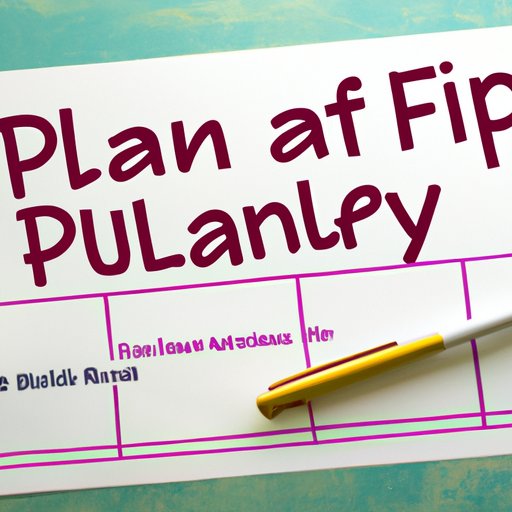Introduction
A personal financial plan is an organized approach to managing your money and planning for the future. It involves setting realistic financial goals, analyzing your current financial situation, creating a budget, and tracking your expenses. Having a personal financial plan can help you achieve financial security and peace of mind.
Benefits of Having a Personal Financial Plan
Having a personal financial plan provides many benefits, including improved financial security, increased savings, and reduced stress and anxiety.
Improved Financial Security
One of the main benefits of having a personal financial plan is improved financial security. Having a plan helps you identify potential risks and develop strategies for mitigating them. You’ll be better equipped to handle unexpected expenses, prepare for retirement, and protect yourself from economic downturns.
Increased Savings
Another benefit of having a personal financial plan is increased savings. A plan helps you identify where you can cut back on unnecessary spending and put more money into savings. With a plan, you can set clear goals for saving and track your progress towards reaching those goals.
Reduced Stress and Anxiety
Finally, having a personal financial plan can reduce stress and anxiety. Knowing that you have a plan in place to manage your finances can provide peace of mind. A plan also allows you to take control of your financial future and make decisions with confidence.
How to Get Started with Creating a Personal Financial Plan
Creating a personal financial plan doesn’t have to be complicated or overwhelming. Here are some steps to get you started:
Gather All Relevant Financial Information
The first step in creating a personal financial plan is to gather all relevant financial information. This includes any bank statements, credit card statements, investment accounts, tax records, and other documents related to your finances. Having this information readily available will make it easier to analyze your current financial situation and create a budget.
Establish Financial Goals
The next step is to establish financial goals. These goals should be specific, measurable, attainable, and realistic. Consider both short-term and long-term goals, such as saving for a down payment on a house, paying off credit card debt, or investing for retirement.
Analyze Current Financial Situation
Once you have gathered all relevant financial information and established financial goals, it’s time to analyze your current financial situation. Take a close look at your income, expenses, assets, liabilities, and cash flow. This will give you a better understanding of your financial health and allow you to identify areas for improvement.
Create a Budget
Creating a budget is an important part of any personal financial plan. Start by listing your income and expenses and then determine how much money you have left over each month. This will help you identify areas where you can cut back on spending and allocate more money towards savings and investments.

Tips for Making a Successful Personal Financial Plan
Here are some tips for making a successful personal financial plan:
Track Expenses
Tracking your expenses is an important part of maintaining a successful personal financial plan. Keeping track of where your money is going will help you identify areas where you’re overspending and make adjustments accordingly.
Automate Payments and Savings
Automating payments and savings can help ensure that you stay on track with your plan. Set up automatic transfers for bills, debt payments, and savings contributions so that you don’t miss a payment or forget to save.
Consider Tax Implications
When creating a personal financial plan, it’s important to consider the tax implications of any investments or other financial decisions you may make. Talk to a tax advisor to make sure you understand the potential tax implications of your plan.
Monitor Progress
Finally, make sure to regularly monitor your progress towards meeting your financial goals. This will allow you to adjust your plan as needed and make sure that you’re staying on track.
What to Include in Your Personal Financial Plan
Your personal financial plan should include an assessment of your assets, liabilities, cash flow analysis, and retirement planning.
Assets
Your assets include any property, investments, savings, or other items of value. Take stock of all of your assets and determine how they can help you reach your financial goals.
Liabilities
Your liabilities include any debts or other obligations that you owe. Take stock of all of your liabilities and determine how you can pay them off as quickly as possible.
Cash Flow Analysis
A cash flow analysis will help you understand how much money you have coming in and going out each month. This will help you identify areas where you can cut back on spending and free up money for savings and investments.
Retirement Planning
Finally, your personal financial plan should include retirement planning. This involves identifying how much money you need to save for retirement and determining which investments and savings vehicles will best help you reach that goal.

The Importance of Setting Financial Goals
Setting financial goals is an important part of any personal financial plan. Goals provide motivation, direction, and clarity. They also help you measure progress and stay on track. Here are some tips for setting effective financial goals:
Short-Term Goals
Short-term goals are those that can be achieved within a year or less. Examples of short-term goals include saving for a vacation, paying off a credit card balance, or starting an emergency fund.
Long-term Goals
Long-term goals are those that take longer than a year to achieve. Examples of long-term goals include buying a house, paying off student loans, or investing for retirement.
Strategies for Achieving Goals
Once you have identified your goals, it’s important to come up with strategies for achieving them. This could involve creating a budget, automating payments and savings, or taking advantage of tax deductions.

Strategies for Achieving Financial Security
Achieving financial security requires planning and discipline. Here are some strategies for achieving financial security:
Reduce Debt
Reducing debt is one of the most important steps in achieving financial security. Make a plan to pay off any credit cards, student loans, or other forms of debt as quickly as possible.
Increase Emergency Funds
It’s also important to have an emergency fund in place in case of unforeseen expenses or job loss. Aim to have at least three to six months’ worth of living expenses saved in an easily accessible account.
Invest Wisely
Finally, investing wisely is key to achieving financial security. Talk to a financial advisor to determine the best investments for your goals and risk tolerance.

How to Make the Most of Your Personal Financial Plan
Making the most of your personal financial plan requires regular maintenance and review. Here are some tips for making the most of your plan:
Seek Professional Advice
It’s always a good idea to seek professional advice when creating or reviewing your personal financial plan. A financial planner or tax advisor can provide valuable insight and help you make informed decisions.
Regularly Monitor Progress
Make sure to regularly monitor your progress towards meeting your financial goals. This will help you stay on track and make adjustments as needed.
Adjust as Needed
Finally, don’t be afraid to make adjustments to your plan as needed. Life changes, and your financial plan should reflect those changes. Be open to making adjustments to keep your plan up to date and on track.
Conclusion
Having a personal financial plan is essential for achieving financial security. A plan provides structure and guidance for managing your money and preparing for the future. It can also help you reduce stress and anxiety and increase savings. The key to success is to start creating a plan and then regularly monitor and adjust it as needed. With a little effort, you can achieve your financial goals and enjoy peace of mind.
(Note: Is this article not meeting your expectations? Do you have knowledge or insights to share? Unlock new opportunities and expand your reach by joining our authors team. Click Registration to join us and share your expertise with our readers.)
